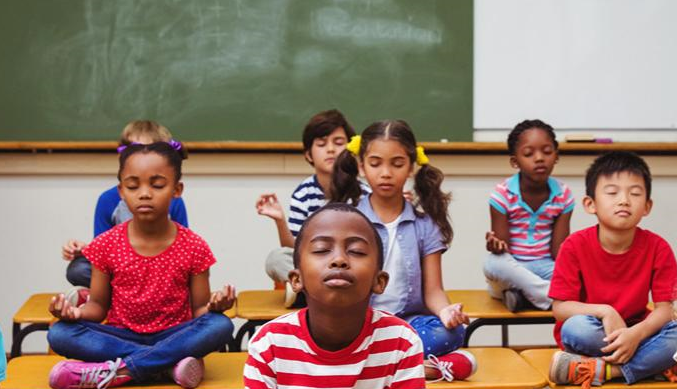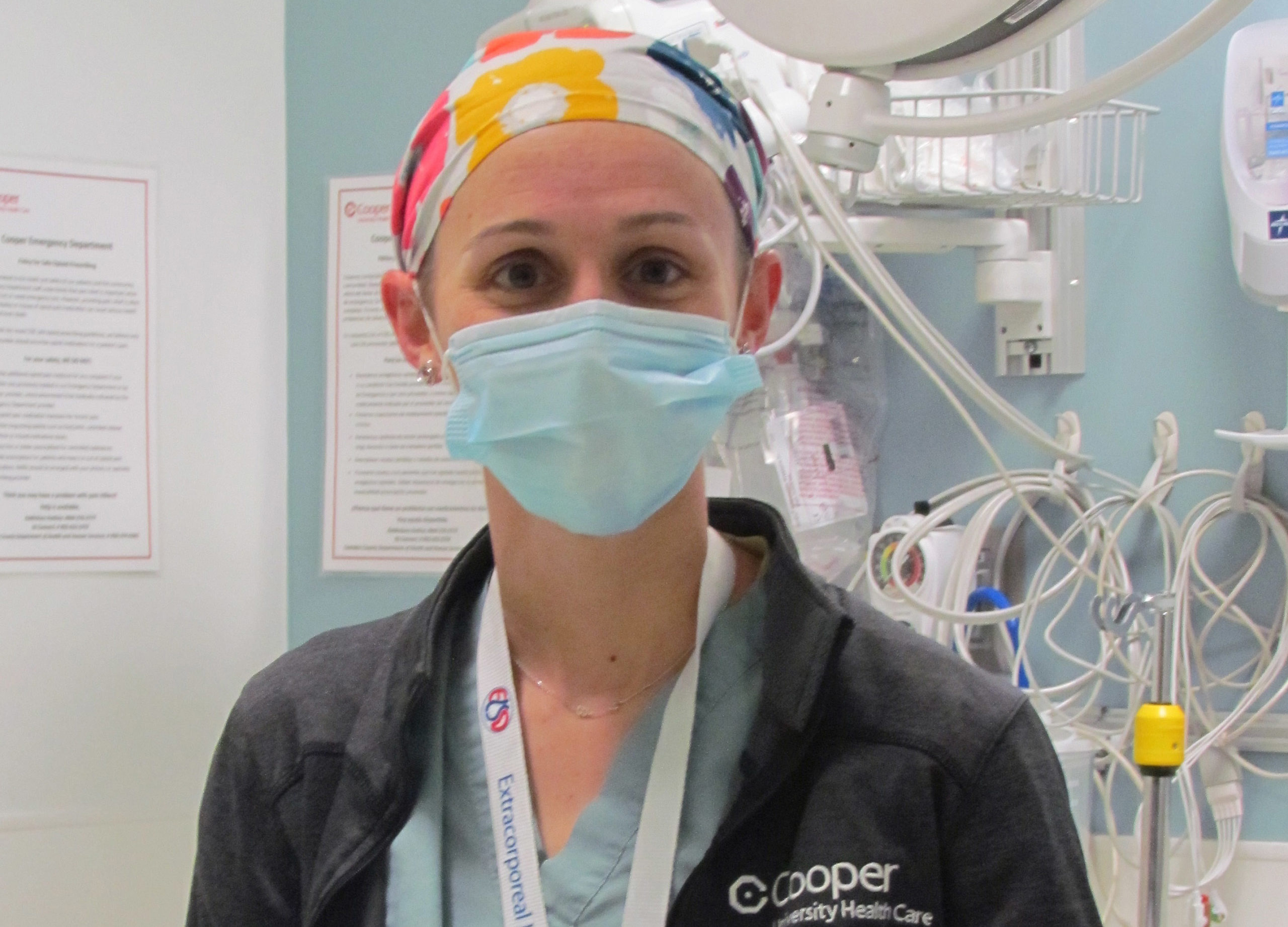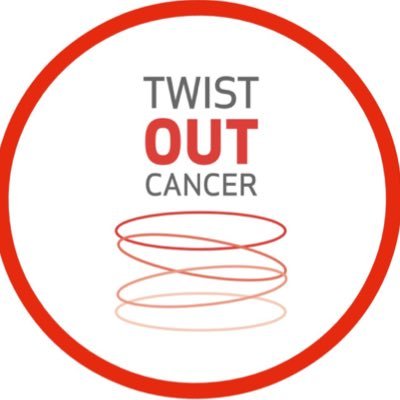Below is a video created by the Department of Food & Nutrition here at Cooper as part of their Earth Day activities.
Category: Uncategorized
Four Critical Pathways of Environmental Wellness and How to Make an Impact
April 22nd is Earth Day. The health of our beautiful planet is the health of our patient. As healthcare providers, we must recognize the link between environmental health and wellbeing and our patients’ health and wellbeing. The environmental impact we have can be categorized within four critical pathways: Shelter and Energy, Transportation and Travel, Food and Water, and Consumer Purchases. Each of these pathways contain habits, actions, and behaviors that can affect our global and local impact. While none of the pathways exist in isolation, individual changes to one pathway may have drastic implications to the impacts of an individual’s sustainable footprint. By exploring each pathway, you can identify your impact, how it relates to the global sustainability challenge, and what you can do to live a more sustainable lifestyle.
Here are some practical steps you can take. You can also join the Green Team and get involved within Cooper by contacting ward-john@cooperhealth.edu or cerceo-elizabeth@cooperhealth.edu.
Ecological Footprint Calculator
What’s Your Water Footprint: Water Footprint Calculator Home Page (watercalculator.org)
The Study.com Mental Health Guide for High School Students
High school is tough and a lot of teens struggle with mental health issues as a result. In fact, according to the National Alliance on Mental Illness (NAMI), one in five teens (aged 13-18) are experiencing a mental health condition. For LGBTQ teens, this number is three times higher. And these mental health issues can become chronic (meaning they follow you into adulthood); 50% of chronic mental illnesses develop at age 14. COVID as amplified all of this.
To see some places where students themselves, parents, and health care providers might intervene check out The Study.com Mental Health Guide for High School Students.
Up-to-Date Free Mental Health Resources for Healthcare Workers
Our colleagues at UVA Health Psychiatry and Neurobehavioral Sciences have compiled an updated list of free mental health resources for healthcare workers. You can access the printable version here to post in your clinic and other work areas, the list is also provided below for ease of access.
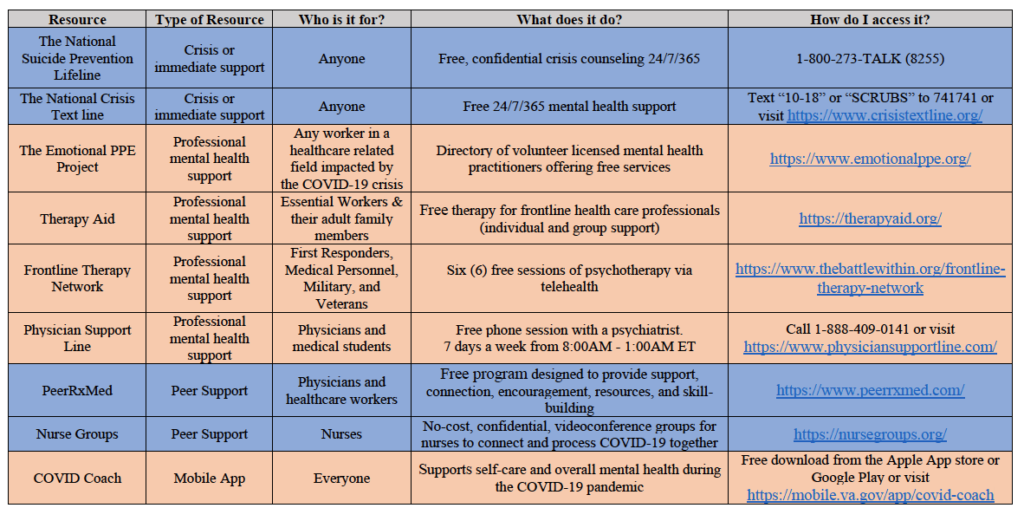
2 Week Stress Decompression Program
Below are details for a 2 Week Stress Decompression Program offered by Motivation Beyond Measure. Topics covered including coping with distress and finding relief from it, overcoming cognitive burden due to stress, and a suite of actionable tools.
Details are available at https://motivationbeyondmeasure.com/stress-decompression/.
Coping with Societal Stressors
This is a summary of the article “What to do about that pit in your stomach in this terrifying American moment” from USAToday.com.
If you’re scared and anxious, you’re not alone.
Maybe you’re afraid about what happened last week, what will happen today, or maybe you’re afraid because you’re playing the tape even further forward.
There does not seem to be a single word to describe what we are experiencing.
“This is an unprecedented moment and people have every right to feel the way that they’re feeling, but we have to take care of ourselves even when things are bad,” said Vaile Wright, senior director of health care innovation at the American Psychological Association. “It’s about focusing on what’s in your control – your thoughts, your feelings, your behavior – and it’s about doing a check-in with yourself and asking, ‘how am I doing and how can I assert some control in a situation that feels out of control?'”
How to Cope During Turmoil
| Focus on what you can control Anita Kanti, author of “Behaving Bravely: How to Mindshift Life’s Challenges.” |
This moment offers both uncertainty and opportunity to continue to navigate a new normal in which we recognize how tenuous it all is. How tenuous it always was. The only certainty we have is around our own attitudes and behaviors. This perspective, can help us not feel disempowered with outward chaos. |
| Look at the Big Picture Afton Kapuscinski, director of the Psychological Services Center at Syracuse University˜ |
Watching the chaos on TV, the chilling images on loop, it’s easy to catastrophize, in those moments it can be helpful to look at the big picture. The justifiable emotions we feel can leave us paralyzed or overwhelmed and contribute to hopelessness and mental health difficulty at a time when we are already dealing with so many challenges as a nation. We feel stuck. A pitfall that often increases the likelihood of being ‘stuck’ is failing to look at the full picture and focusing more narrowly on a single event or series of upsetting events. There is a way to acknowledge the magnitude of this moment while also taking into account other data points that suggest things like our democracy are still functioning – courts have found our election processes are fair and counts are accurate, and most lawmakers desire to uphold the will of the people. “If you are struggling emotionally today, try to ‘zoom out’ and see if you are neglecting any important hopeful, positive indicators,” she said. |
| Take a Break Vaile Wright, senior director of health care innovation at the American Psychological Association |
When stressful situations begin to impact basic functioning, it’s important to enforce limits. If you’re having a visceral reaction to watching or reading the news – that pit in your stomach, for example – consider shutting down. Take a walk. Read a book. “You should take breaks from watching the news, especially now because what we’re seeing are the same images over and over again,” Wright said. “Even if you feel you’re going to learn something new, you’re probably not. This includes social media too.” Also be mindful of activities you engage in right before bed. If you want to check the news one more time, make sure to give yourself at least an hour to calm down. |
| Ground Yourself Mary Alvord, a licensed psychologist in Rockville, Maryland |
This will look different for everyone. It can be breath work, holding your breath in for a full count and letting it out for a full count. It can be dinner with family, a watch party with friends, or a phone call to someone you know will make your feelings a priority. Reach for what centers and de-stresses you. “You need to calm down, so that you can come back and have some perspective,” Alvord said. |
| Practice gratitude Afton Kapuscinski, director of the Psychological Services Center at Syracuse University |
This may seem counterintuitive in the midst of multiple national crises, but research indicates gratitude practice improves well-being in the face of adversity and distress. “Examine your life and context at micro and macro levels and identify what is going well rather than what is going wrong,” she said. “Gratitude is not about minimizing tragic or difficult events, rather, it is about elevating and enjoying the positive ones.” |
This is a summary of the article “What to do about that pit in your stomach in this terrifying American moment” from USAToday.com.
New Resource! COVID-19 Child Care Tuition Assistance Program
New Jersey Human Services Commissioner Carole Johnson announced that applications are now open for the new COVID-19 child care tuition assistance program the Murphy Administration has created to help families with child care costs as schools open remotely.
The $150 million program will provide child care tuition assistance to New Jersey families with incomes up to $75,000 that are in need of either full or part-time child care due to their child’s remote learning schedule.
Learn more at https://www.nj.gov/governor/news/news/562020/20200921a.shtml
Mindfulness Mondays – 5 Minute Breathing Exercise
Every Monday, the Daily Dose is dedicated to starting your week right with a brief guided mindfulness exercise. For those of you who have jam packed schedules and feel that it is difficult to fit mindfulness in, today we offer a very brief and very effective exercise. The goal of this activity is to notice when the hectic nature of the day is seeping in and to hit reset – spending a few minutes focused on your breathing. This exercise comes courtesy of the app Stop, Breathe & Think.
We hold the phone and we cry
When I leave the ICU every night, my cell phone battery is always in the red, but I am certain that each phone call to a patient’s family is the most important “procedure” that I performed that day, Dr. Emily Damuth says. Read her opinion piece at
https://www.nj.com/opinion/2020/04/we-hold-the-phone-and-we-cry.html
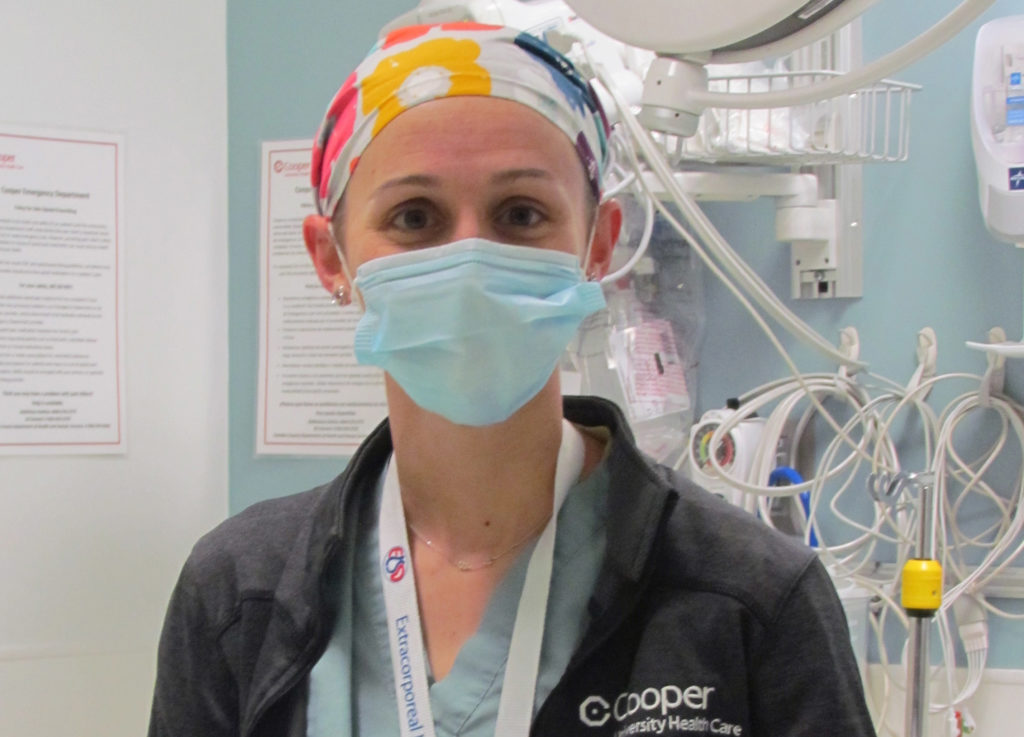
Twist Out Cancer National Resilience Campaign
Resilience is about utilizing our inner strength, and drawing from the lessons of others to simply survive and persevere. It is not about finding our way back to where we were but rather it is about seeing this as an opportunity to chart a new course. Twist Out Cancer has launched their own resilience campaign, which includes such activities free weekly art therapy sessions. Details at https://twistoutcancer.org/resilience.

